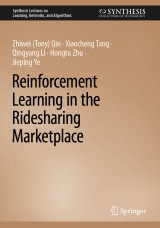Details

Reinforcement Learning in the Ridesharing Marketplace
Synthesis Lectures on Learning, Networks, and Algorithms
|
42,79 € |
|
| Verlag: | Springer |
| Format: | |
| Veröffentl.: | 03.08.2024 |
| ISBN/EAN: | 9783031596407 |
| Sprache: | englisch |
| Anzahl Seiten: | 200 |
Dieses eBook enthält ein Wasserzeichen.
Beschreibungen
This book provides a comprehensive overview of reinforcement learning for ridesharing applications. The authors first lay out the fundamentals of the ridesharing system architectures and review the basics of reinforcement learning, including the major applicable algorithms. The book describes the research problems associated with the various aspects of a ridesharing system and discusses the existing reinforcement learning approaches for solving them. The authors survey the existing research on each problem, and then examine specific case studies. The book also includes a review of two of methods closely related to reinforcement learning: approximate dynamic programming and model-predictive control.
<p>Introduction.- Ridesharing.- Reinforcement Learning Prime.- Pricing & Incentives.- Online Matching.- Vehicle Repositioning.- Routing.- Ride-pooling.- Related Methods.- Open Resources.- Challenges and Opportunities.- Closing Remarks.</p>
<p>Zhiwei (Tony) Qin, Ph.D., is a Principal Scientist at Lyft Rideshare Labs. He earned his Ph.D. from Columbia University. His research interests include operations research, machine learning, deep learning, and big data analytics, with applications in smart transportation and E-commerce.</p>
<p>Xiaocheng Tang, Ph.D., is an AI Research Scientist at Meta. He earned his Ph.D. from Lehigh University. His research interests lie at the intersection of machine learning, reinforcement learning, and optimization.</p>
<p>Qingyang Li, Ph.D., is a Senior Engineering Manager at DiDi Autonomous Driving. He earned his Ph.D. from Arizona State University. His research interests include machine learning, deep learning, reinforcement learning, and computer vision.</p>
<p>Jieping Ye, Ph.D. is affiliated with the Alibaba Group. He earned his Ph.D. from the University of Minnesota. His research interests include machine learning, data mining, artificial intelligence, transportation, and biomedical informatics.</p>
<p>Hongtu Zhu, Ph.D. is a Professor in the Department of Biostatics at The University of North Carolina at Chapel Hill. He earned his Ph.D. at The Chinese University of Hong Kong. His research interests include medical imaging analysis, imaging genetics, artificial intelligence, statistics, biostatics, and computational neuroscience.</p>
<p> </p>
<p>Xiaocheng Tang, Ph.D., is an AI Research Scientist at Meta. He earned his Ph.D. from Lehigh University. His research interests lie at the intersection of machine learning, reinforcement learning, and optimization.</p>
<p>Qingyang Li, Ph.D., is a Senior Engineering Manager at DiDi Autonomous Driving. He earned his Ph.D. from Arizona State University. His research interests include machine learning, deep learning, reinforcement learning, and computer vision.</p>
<p>Jieping Ye, Ph.D. is affiliated with the Alibaba Group. He earned his Ph.D. from the University of Minnesota. His research interests include machine learning, data mining, artificial intelligence, transportation, and biomedical informatics.</p>
<p>Hongtu Zhu, Ph.D. is a Professor in the Department of Biostatics at The University of North Carolina at Chapel Hill. He earned his Ph.D. at The Chinese University of Hong Kong. His research interests include medical imaging analysis, imaging genetics, artificial intelligence, statistics, biostatics, and computational neuroscience.</p>
<p> </p>
<p>This book provides a comprehensive overview of reinforcement learning for ridesharing applications. The authors first lay out the fundamentals of the ridesharing system architectures and review the basics of reinforcement learning, including the major applicable algorithms. The book describes the research problems associated with the various aspects of a ridesharing system and discusses the existing reinforcement learning approaches for solving them. The authors survey the existing research on each problem, and then examine specific case studies. The book also includes a review of two of methods closely related to reinforcement learning: approximate dynamic programming and model-predictive control. </p>
Explains the benefits of taking a reinforcement learning approach to ridesharing optimization problems Analyzes a number of specific works that cover the optimization of ridesharing platforms using reinforcement learning Highlights the major challenges and opportunities that are crucial for advancing reinforcement learning for ridesharing


















